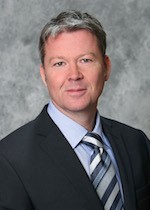Roy named as a new member of the NASA Global Ecosystem Dynamics Investigation (GEDI) science team
February 1, 2024
 David Roy, director of the Center for Global Change and Earth Observations (CGCEO) at Michigan State University and a professor of geography, has been named a new member of the NASA Global Ecosystem Dynamics Investigation (GEDI) science team. The GEDI instrument is the first Light Detection and Ranging (LiDAR) sensor designed to measure vegetation height from space and was launched by NASA to the International Space Station (ISS) in 2018. Dr. Roy joins 15 other NASA-funded scientists to use past and future GEDI data to address scientific questions in terrestrial carbon cycle science, biodiversity, and ecology.
David Roy, director of the Center for Global Change and Earth Observations (CGCEO) at Michigan State University and a professor of geography, has been named a new member of the NASA Global Ecosystem Dynamics Investigation (GEDI) science team. The GEDI instrument is the first Light Detection and Ranging (LiDAR) sensor designed to measure vegetation height from space and was launched by NASA to the International Space Station (ISS) in 2018. Dr. Roy joins 15 other NASA-funded scientists to use past and future GEDI data to address scientific questions in terrestrial carbon cycle science, biodiversity, and ecology.
Dr. Roy and his MSU team will undertake research using GEDI to quantify central Africa tropical forest regrowth and the role that regrowing forests play in the global carbon cycle. “Nearly half of the world’s tropical forests are regrowing after being disturbed, and if left to regrow, provide a low-cost mechanism for carbon sequestration and an effective pathway to help mitigate climate change,” commented Dr. David Skole, a professor in the Department of Forestry, and project collaborator. “The research builds on another of our projects funded by a San Fransico-based company, Wildlife Works, who are leaders in the emerging marketplace for carbon offset accounting to provide sustainable funding mechanisms for biodiverse forest protection and community development,” said Dr. Roy.
“Our research is focused on a forest site in the Democratic Republic of the Congo where we have undertaken challenging but really rewarding fieldwork,” said Dr. Herve Kashongwe, a recent graduate of the Department of Geography, Environment, and Spatial Sciences, and project co-investigator. “We have been developing AI-based approaches to map forest canopy cover and loss,” said co-investigator Dr. Myung Cho of CCGEO. “The opportunity to extend this research to quantify forest regrowth using GEDI data is exciting and relevant in a time when human activity and climate change are increasingly recognized as having local to global impacts,” commented Dr. Roy.

